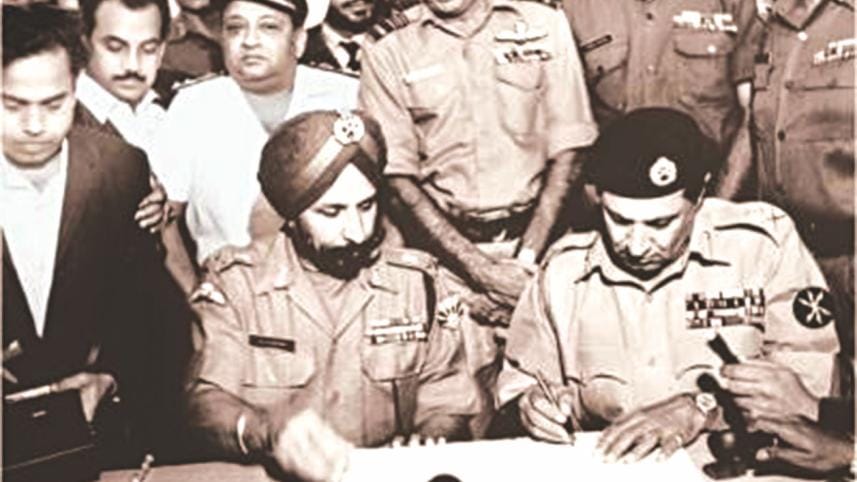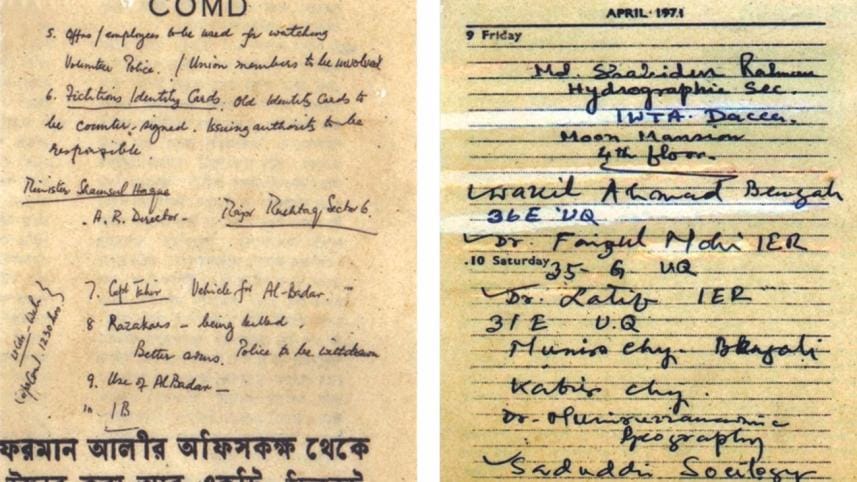Pakistani Viewpoint: Killing of Bengali Intellectuals

From December 10, 1971 with active support of the Pakistan Army the young members of Al-Badr, the secret killing squad of Jamaat-e-Islami, started its operation to pick up the leading intellectuals of the country and confine them in their camp at the Physical Training Centre, Mohammadpur. The intellectuals were tortured and brutally killed in the early hours of December 14, their dead bodies dumped at the riverside brickfield of Rayer Bazar. Major General A.A.K. Niazi was the Commander of Eastern Command and Lt. General Rao Farman Ali was in charge of civil administration, the Al-Badar operations being under his wings. The blame for the killing of intellectuals lie on Rao Farman Ali while Lt. Gen. A.K. Niazi cannot evade responsibility as he was in charge of military operations.
We have reproduced here three versions of the intellectual killing as produced by them in their memoirs and report. While Niazi has mentioned in passing Farman's role in the killing of intellectuals, the latter gave an elaborate account in trying to save his skin. Hamoodur Rahman Commission report has not done any substantial inquiry, on the other hand was eager to drop charges against both Farman and Niazi. The versions are reproduced below:
1. General A K Niazi's account:
DISMEMBERMENT OF PAKISTAN
On the night of 15/16 December, I ordered our helicopters to Burma. Some interested persons started a controversy about General Rahim Khan's evacuation by helicopter to Burma. He did very well during the insurgency operations as GOC 14 Division and was awarded Hilal-e-Jur'at. During the war he was commanding an ad hoc Division at Chandpur when the enemy broke through nearby and threatened his HQ. He was ordered to fall back on his designated positions for the defence of Dhaka. During evacuation of his HQ some of the ferries got stuck in the chars and were delayed. As a result, on their way back to Narayanganj they were attacked by the Indian Air Force. His HQ boat was sunk and we lost many brave soldiers and officers. General Rahim was wounded and was evacuated to CMH Dhaka. He was evacuated under my personal orders with some important papers to be delivered to GHQ. These papers reached Bhutto's house and were never made available when required. Separate helicopters were allotted for the nurses. In the darkness, however, the nurses reached the wrong helipad and could not get to the designated one. Their seats remained empty and the helicopters were flown to Burma without them.
Maj. Gen. Farman insisted that he should also be evacuated to Burma or West Pakistan on the night 15/16 December because the Mukti Bahini would kill him for his alleged massacre of the Bengalis and intellectuals. It was pathetic to see him pale and almost on the verge of a breakdown. I gave him my solemn assurance that I would protect him from the Mukti Bahini and the Indians even at the cost of my life. I only hope that he would acknowledge that, in spite of persistent demands from the Indians and the Mukti Bahini, I emphatically refused to let anybody touch him.
2. Major General Rao Farman Ali
HOW PAKISTAN GOT DIVIDED 189
On 10 December at about sunset I was asked by Maj. Gen Jamshed, Commander Dacca, to come over to his office at Pheel Khana, Dhanmandi. On getting closer to his command post I saw a number of vehicles. He was coming out of his bunker and asked me to get in with him in his car.
After a few minutes I asked him as to what were these vehicles for. He said, 'That is what we are going to discuss with Niazi," While on our way to the Corps HQ he told me that he had received orders to arrest a large number of intellectuals and other prominent persons. I said, "Why, what for? This is not the time to do such a thing." Jamshed said, 'Tell this to Niazi." When we got to Niazi's office, Jamshed raised the question. Niazi asked my views. I said, "Now is not the time. You will have to give an account of those you had arrested earlier. Please do not arrest any more." He agreed.
My fear, is that orders countermanding the earlier orders were perhaps not issued and some people were arrested. I do not till this day know where they were kept. Perhaps they were confined in an area which was guarded by Mujahids. The Corps or the Dacca Garrison Commander lost control over them after surrender and they ran away out by fear of Mukti Bahini who were mercilessly killing Mujahids. The detained persons might have been killed by Muktis (freedom fighters) or even by the Indian Army to give Pakistan Army a bad name. Dacca had already been taken over by the Indians.

While we were still in Dacca, I was called by Major General Nagra of the Indian Army and confronted with this accusation. I asked him, "How could I be involved. I could not have killed so many people single-handedly. I have no command. I have no civilian authority." He accepted. But the question was re-opened when we reached Jabbalpur. Brigadier Leslie DDMI Indian Army came to interrogate us. His first question was, 'You are accused of having got 200 intellectuals killed on 16/17 December. What have you to say about it?" I said, "Gen Niazi is sitting upstairs. Go and ask him: did I or did I not oppose the arrest of these people on 10 December. If I was opposed even to their arrest, how could I order their killing." He got up immediately and went away to see Niazi. After ten minutes or so he came back and extending his hand said that he had no more questions to ask: Niazi had confirmed what I had told Leslie.
The Indians themselves were very keen to find proof to implicate any responsible person of the Pakistan Army with the incident, Brigadier Bashir of East Pakistan Rifles and 50 other officers were kept in solitary confinement in. Delhi and grilled thoroughly. One of the officers told me that they had offered to expedite repatriation of anyone who would say that General Farman had given orders for the killings. Not one did for which I am indebted to them for life. Not one was tempted by the offer. And here in West Pakistan the allegations that the Pakistan Army killed the intellectuals of East Pakistan were given wide publicity. The purpose was political to malign the army.
After having been cleared by both the Special Committee of GHQ (called Aftab Committee) and the Hamoodur Rahman Commission I was posted as Director General Military Training in GHQ. This was a cear indication of the verdict but I got confirmation from outside Pakistan.

3. Hamoodur Rahman Commission Report
ALLEGED KILLING OF INTELLECTUALS DURING DECEMBER 14, 1971
This again is a matter, which was specifically raised by Sk. Mujibur Rahman during his meeting with the Prime Minister at Dacca. According to Maj. Gen. Farman Ali it was on the 9th and 10th of December 1971 that he was rung up in the evening by Maj. Gen. Jamshed, who was the Deputy Martial Law Administrator for Dacca Division and asked to come to his headquarters in Peelkhana. On reaching the headquarters he saw a large number of vehicles parked there. Maj. Gen. Jamshed was getting into a car and he asked Maj. Gen. Farman Ali to come along. They both drove to Headquarters of Eastern Command to meet Lt. Gen. Niazi and on the way Maj. Geri. Jamshed informed Maj. Gen. Farman that they were thinking of arresting certain people. Gen. Farman Ali advised against it. On reaching Lt. General Niazi's headquarters he repeated his advice, on which Lt. Gen. Niazi kept quiet and so did Maj. Gen. Jamshed. Maj. Gen. Farman Ali has stated that he cannot say anything as to what happened after he came away from the headquarters but he thinks that no further action was taken.
When questioned on this point, Lt. Gen. A. A. K. Niazi stated that the local Commanders had, on the 9th of December 1971, brought a list to him that included the names of miscreants, heads of Mukti Bahini etc., but not any intellectuals but he had stopped them from collecting and arresting these people. He denied the allegation that any intellectuals were in fact arrested and killed on the 9th December 1971 or thereafter.
Maj. Gen. Jamshed has, however, a slightly different version to offer. He says that it was on the 9th and 10th of December 1971 that General -Niazi expressed his apprehension of a general uprising in the Dacca city and ordered him to examine the possibility of arresting certain persons according to lists which were already with the various agencies, namely the Martial Law Authorities and the Intelligence Branch. A conference was held on the 9th and 10th of December 1971 in which these lists were produced by the agencies concerned and the total number of persons to be arrested came to about two or three thousand. According to him, arrangements for accommodation, security guards, missing and the safety of the arrested persons from bombing/strafing by the Indian Air Force presented insurmountable problems and therefore, he reported back to Lt. Gen. Niazi that the proposal be dropped. He states that thereafter no further action was taken in this matter.
A DESK DIARY THAT EXPOSES
THE BLATANT LIE
The Desk Diary of Rao Farman Ali had the name of intellectuals scribbled by his own hand writing. Moreover it also mentions the arrangement of vehicles for the Al-Badar which clearly shows he knew all about the transports mentioned in his memoir and in the Commission report.
The writer is a cultural activist and essayist. He is a founder Trustee of the Liberation War Museum.
 For all latest news, follow The Daily Star's Google News channel.
For all latest news, follow The Daily Star's Google News channel.
Comments